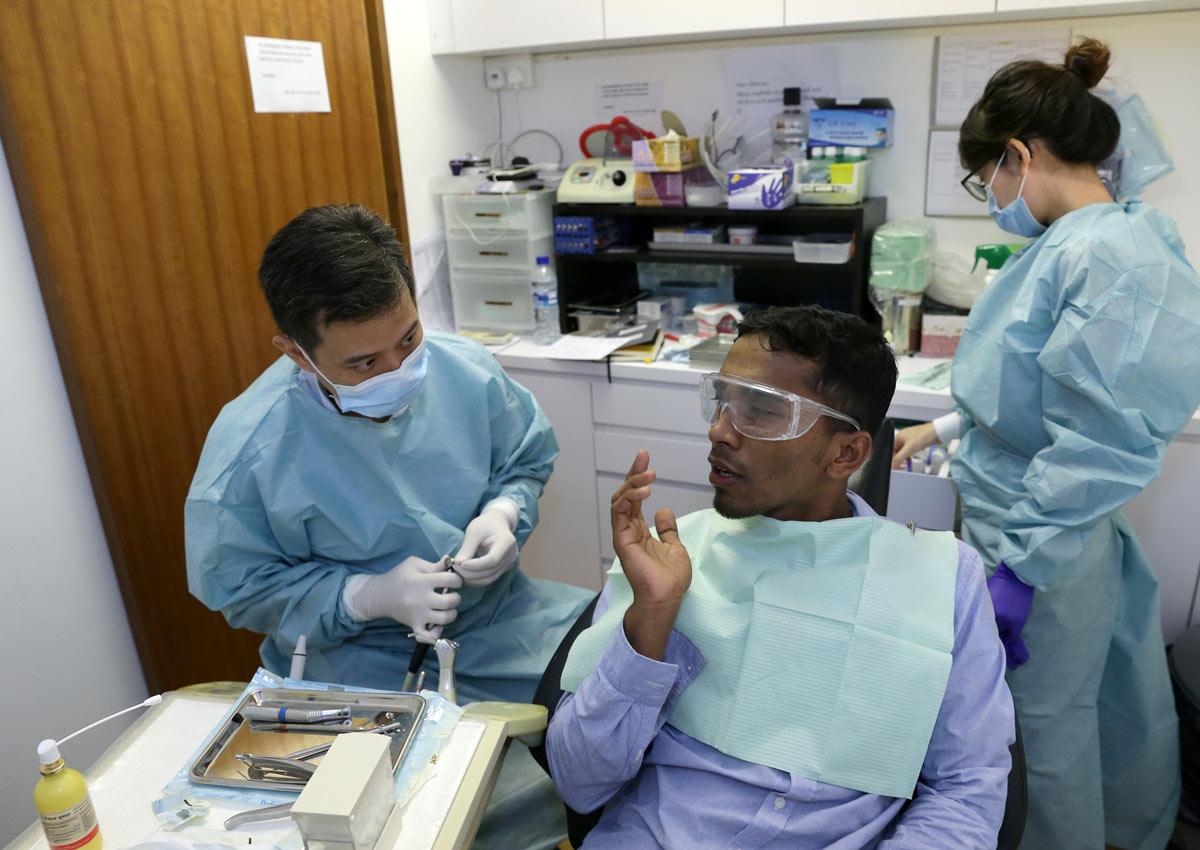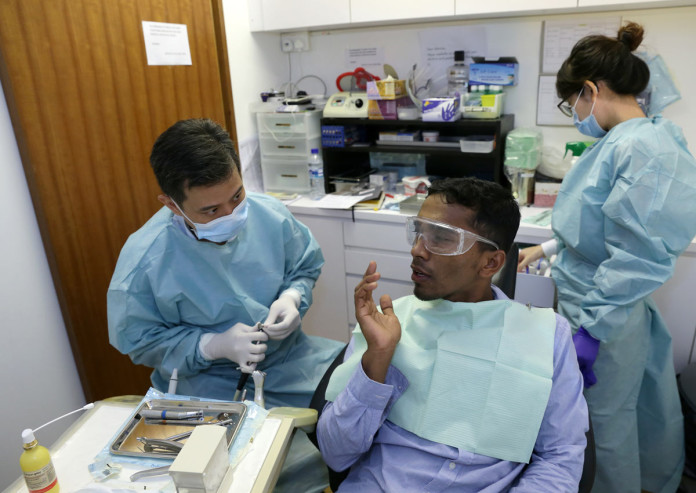Founded in 2006 by GP Goh Wei Leong and social worker Tang Shin Yong, the charity has 10 staff members and 300 volunteers, and relies on public donations.
It focuses on foreign workers who are injured and unable to work while they wait for the outcome of injury claims.
It has clinics in Geylang, Jurong and Mandai, a help centre and shelter in Desker Road, a shelter in MacPherson, and a welfare centre in Tai Seng.
It is 6.50pm on a Wednesday.
In Lorong 23 Geylang, a line of men, all foreigners, forms along a dimly lit corridor.
While they wait, some clutch their backpacks while a few play games on their mobile phones.
Nearby, the crowd at a coffee shop builds up.
Across Geylang Road at Lorong 18, the pink lights and lanterns of brothels beckon to men who walk by.
But the men in the line do not have dinner or physical pleasure on their minds.
Instead, they are waiting to see doctors at a low-cost clinic for foreign workers run by HealthServe.
“The workers pay $5 for each visit,” says the group’s executive director Colin Chia.
“Those who are on Special Pass and not working do not pay anything.”
HealthServe has been running the Geylang clinic since 2007.
It also has clinics in Jurong and Mandai.
Last year, it opened a dental clinic in Geylang, where foreign workers pay $10 for services such as tooth extraction and fillings.
The clinics are run by volunteers.
The NGO has on its volunteers’ roster about 100 doctors and dentists and 180 nurses, pharmacists and clinic assistants.
The number of foreign workers who visit its clinics has soared from 2,646 in 2013 to 6,898 in the first 11 months of this year.
One reason, says Mr Chia, is that HealthServe is the only non- governmental organisation (NGO) here that provides low-cost medical care for foreign workers.
HealthServe’s co-founder, Dr Goh Wei Leong, says he did not start out with a plan to run an NGO .
“We started a clinic because we saw the need to provide affordable medical services to migrant workers,” says the general practitioner.
“The rest of the services just grew.”
HealthServe was registered as a company limited by guarantee in 2006.
“I relied on my network of friends for donations,” Dr Goh says.
It became a charity in 2011.
“We wanted to hold a fund-raising dinner and donors asked whether we could issue tax exemption receipts. That prompted us to register HealthServe as a charity,” he adds.
HealthServe also runs a welfare centre in Tai Seng where social activities and training classes are held on weekday nights.
The workers it helps are those who are stranded after getting injured.
HealthServe manager Eric Lee says this group of workers is the most vulnerable.
“They are injured, they cannot work and cannot send money to their families,” he says. “They can become depressed.”
The Ministry of Manpower (MOM) says on its website that most claims are settled within three to six months, but some injuries need more time to stabilise before a doctor can assess the extent of permanent disability, which affects the compensation.
It declined to say how many injury claims made by foreign workers it handles each year or give details on the time taken to process the claims.
Last year, HealthServe gave out $223,320 in social assistance to such stranded foreign workers through free meals, temporary shelter and MRT card top-ups.
It housed 35 workers last year at its MacPherson shelter. In July this year, it opened a second shelter in Desker Road.
Mr Lee, who manages the Desker Road centre, says the number of workers seeking help there “shot up to more than 200 cases in less than two months”.
To help them, Mr Lee and two centre employees provide free lunches, while volunteers hold social activities.
Last month, they took workers to see Christmas lights in Orchard Road.
Counsellors are present to speak to workers in the evenings.
Providing affordable medical care to foreign workers and social assistance to workers in distress will continue to be the mainstay of HealthServe’s work, says Mr Chia.
Construction worker Ahammad Rubal appreciates the medical and dental services HealthServe offers.
The 25-year-old, who has worked in Singapore for two years, paid more than $100 to see a private dentist for a toothache earlier this year.
“(It was) expensive and my tooth (was) still painful,” he says.
Read Also: Kudos to NGOs that help Singapore’s migrant workers
A friend told him about HealthServe and he went to see Dr Winston How, a volunteer dentist, last week. He got a filling and follow-up treatment.
Mr Chia says HealthServe is looking at opening two more dental clinics next year.
Last year, it worked with researchers at the National University of Singapore to survey Bangladeshi workers on their diet.
The study found over nine in 10 of them were given stale food to eat.
Dr Goh hopes to do more research on the problems foreign workers face, including those they have before coming to Singapore.
He says: “This will help us understand them so that we can help them holistically, rather than helping them when they come to us in distress.”

This article was first published on December 18, 2016.
Get a copy of The Straits Times or go to straitstimes.com for more stories.







